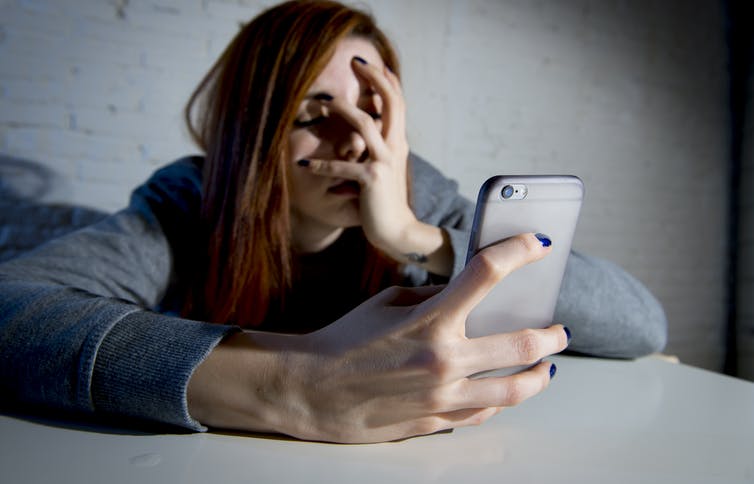
Shutterstock
<p>Concerns about rising levels of scamming and harassment prompted online safety organisation <a href="https://www.netsafe.org.nz/" target="_blank">NetSafe</a> <a href="https://www.nzherald.co.nz/nz/news/article.cfm?c_id=1&;objectid=12318228" target="_blank">to issue a warning</a> to users to maintain vigilance. This abuse has included threats of violence and explicit <a href="https://www.aljazeera.com/news/2020/04/anti-asian-hate-continues-spread-online-covid-19-pandemic-200405063015286.html" target="_blank">racism and xenophobia</a>.</p>
<p>Online abuse breaches several human rights. We argue that governments have obligations under international law and should establish a digital human rights charter, with special protections built in for women and children.</p>
<h2>Cyber violence against women</h2>
<p>Online platforms replicate culture with all its offline risks and inequalities.</p>
<p>Offline, discrimination against women permeates <a href="http://docstore.ohchr.org/SelfServices/FilesHandler.ashx?enc=6QkG1d%2fPPRiCAqhKb7yhsqMFgv33OTgoZv7ZAgL6thAQ9IftfPs3g9t3r4w6hFnRBqTwEr%2biim0%2bsAlJpAatSmEIaiBa2tDiXsJJkM5ckb%2fmDeJMOEw4XS%2fWDcWV%2fXkK" target="_blank">all aspects of our society</a>, including the family, education, the workplace, the legal system and government. Discrimination manifests in different ways, including <a href="http://docstore.ohchr.org/SelfServices/FilesHandler.ashx?enc=6QkG1d%2fPPRiCAqhKb7yhsldCrOlUTvLRFDjh6%2fx1pWAeqJn4T68N1uqnZjLbtFua2OBKh3UEqlB%2fCyQIg86A6bUD6S2nt0Ii%2bndbh67tt1%2bO99yEEGWYpmnzM8vDxmwt" target="_blank">violence against women</a>.</p>
<p>These unequal gender dynamics <a href="https://documents-dds-ny.un.org/doc/UNDOC/GEN/G18/184/58/PDF/G1818458.pdf?OpenElement" target="_blank">repeat online</a>, resulting in women being subjected to sexist, misogynistic and violent content. In 2018, a UN women’s human rights expert <a href="https://documents-dds-ny.un.org/doc/UNDOC/GEN/G18/184/58/PDF/G1818458.pdf?OpenElement" target="_blank">recognised cyber violence</a> as a specific form of violence against women.</p>
<p>In a <a href="https://www.amnesty.org.nz/amnesty-reveals-alarming-impact-online-abuse-against-women" target="_blank">2017 Amnesty International survey</a>, nearly a quarter (23%) of women surveyed across eight developed countries said they had experienced online abuse or harassment more than once. Of those women, 41% felt their physical safety was threatened on at least one occasion.</p>
<p>In New Zealand, a third of women reported being victims of online harassment. Of those who experienced abuse online:</p>
<ul>
<li>75% had trouble sleeping well</li>
<li>49% felt their personal safety was at risk</li>
<li>32% felt the safety of their families was at risk</li>
<li>72% were less able to focus on everyday tasks</li>
<li>70% experienced lower self-esteem or loss of self-confidence</li>
<li>two-thirds felt a sense of powerlessness.</li>
</ul>
<p>Almost half (49%) reduced their use of social media or left platforms altogether.</p>
<p>The UN’s Human Rights Council identified <a href="https://undocs.org/en/A/HRC/38/47" target="_blank">widespread online violence against women</a> as a significant reason for the <a href="https://undocs.org/A/HRC/35/9" target="_blank">global digital divide between men and women</a>.</p>
<p>Online violence against women by (mostly) men is especially persistent on social media platforms like <a href="https://www.theguardian.com/technology/2019/mar/04/facebook-women-abuse-harassment-social-media-amnesty" target="_blank">Facebook</a>, <a href="https://www.newsroom.co.nz/2019/02/20/449770/twitters-huge-fail-on-online-abuse" target="_blank">Twitter</a> and <a href="https://www.theatlantic.com/technology/archive/2018/10/instagram-has-massive-harassment-problem/572890/" target="_blank">Instagram</a>. It includes online harassment, cyberstalking, “doxing” (where private information is shared by others online) and <a href="https://www.sciencedirect.com/science/article/pii/S0747563218305454?via%3Dihub" target="_blank">revenge pornography</a>.</p>
<h2>Obligations of governments and online platforms</h2>
<p>Cyber violence breaches international human rights laws, including the <a href="https://www.ohchr.org/en/professionalinterest/pages/ccpr.aspx" target="_blank">right to freedom of expression</a> (fewer women are likely to share their opinions or thoughts online), the <a href="https://www.ohchr.org/en/professionalinterest/pages/ccpr.aspx" target="_blank">right to be free from discrimination and violence</a>, the <a href="https://undocs.org/A/HRC/35/9" target="_blank">right to information about health</a> (including potentially life-saving updates about COVID-19) and the <a href="https://www.ohchr.org/EN/Issues/DigitalAge/Pages/DigitalAgeIndex.aspx" target="_blank">right to privacy</a>.</p>
<p>International human rights law applies both <a href="https://undocs.org/A/RES/68/167" target="_blank">offline and online</a>.</p>
<p>Social media platforms have created <a href="https://help.twitter.com/en/rules-and-policies/twitter-rules" target="_blank">community standards</a> to protect users’ human rights, but they may not be evolving fast enough during disruptive times such as we are experiencing now. The massive increase in use is likely to amplify the <a href="https://www.theguardian.com/lifeandstyle/2016/nov/22/emotional-violence-cyberbullying-trolling-bullying-racism-misogyny" target="_blank">dark side of social media</a>.</p>
<p>Governments around the world have been slow to use their legislative powers to regulate online platforms. The live streaming of the Christchurch mosque attacks on March 15 2019 highlighted the platforms’ failure to control the spread of hateful content.</p>
<p>An <a href="https://www.christchurchcall.com/" target="_blank">international agreement</a> to eliminate violent extremist content online has been difficult to achieve.</p>
<h2>Protecting rights and lives online</h2>
<p>While platforms remain global with “one size fits all” community standards, governments have different responses to restricting individual freedom of expression.</p>
<p>Governments should consider establishing an international charter on digital human rights, which all social media platforms could adopt. Such a charter would enable a coherent and consistent response to cyber violence, in a world that is now almost exclusively online.</p>
<p>There are some practical steps we can all take. These steps include <a href="https://help.twitter.com/en/safety-and-security/report-abusive-behavior" target="_blank">reporting online violations</a>, <a href="https://help.twitter.com/en/using-twitter/blocking-and-unblocking-accounts" target="_blank">blocking</a> people or groups, and closely monitoring connections.</p>
<p>If you are experiencing serious online bullying, harassment, revenge porn or other forms of abuse and intimidation, <a href="https://www.police.govt.nz/advice-services/cybercrime-and-internet/harmful-digital-communications-hdc" target="_blank">contact police who may take action</a> under the <a href="http://www.legislation.govt.nz/act/public/2015/0063/latest/whole.html" target="_blank">Harmful Digital Communications Act 2015</a>.<!-- Below is The Conversation's page counter tag. Please DO NOT REMOVE. --><img style="border: none !important; box-shadow: none !important; margin: 0 !important; max-height: 1px !important; max-width: 1px !important; min-height: 1px !important; min-width: 1px !important; opacity: 0 !important; outline: none !important; padding: 0 !important; text-shadow: none !important;" src="https://counter.theconversation.com/content/135678/count.gif?distributor=republish-lightbox-basic" alt="The Conversation" width="1" height="1" /><!-- End of code. If you don't see any code above, please get new code from the Advanced tab after you click the republish button. The page counter does not collect any personal data. More info: https://theconversation.com/republishing-guidelines --></p>
<p><a href="https://theconversation.com/profiles/cassandra-mudgway-409973" target="_blank">Cassandra Mudgway</a>, Senior Lecturer in Law, <em><a href="https://theconversation.com/institutions/auckland-university-of-technology-1137" target="_blank">Auckland University of Technology</a></em> and <a href="https://theconversation.com/profiles/kate-jones-698270" target="_blank">Kate Jones</a>, Senior lecturer in Digital Marketing &; Social Media, <em><a href="https://theconversation.com/institutions/auckland-university-of-technology-1137" target="_blank">Auckland University of Technology</a></em></p>
<h6>This article is republished from <a href="https://theconversation.com" target="_blank">The Conversation</a> under a Creative Commons license. Read the <a href="https://theconversation.com/as-use-of-digital-platforms-surges-well-need-stronger-global-efforts-to-protect-human-rights-online-135678" target="_blank">original article</a>.</h6>

NZEI Te Riu Roa is considering legal action against the government for the disestablishment of…
NZQA is implementing AI-marking for all Year 10 written assessments from this year onwards, following…
Teaching personal financial responsibility isn't enough. Children should be taught broader economic context, argue New…
When students can't hear the teacher, they can't learn properly. Sound quality matters in education…
The Garden City is rich with learning opportunities, no matter what subject or part of…
Teaching Council of Aotearoa launch school leaders’ stories project with Unteach Racism to challenge institutional…
This website uses cookies.